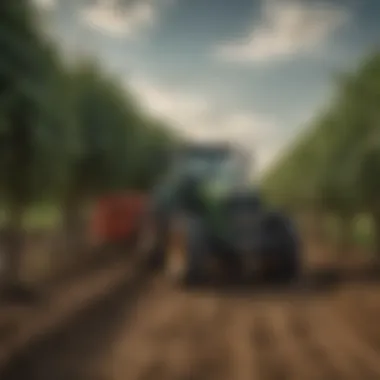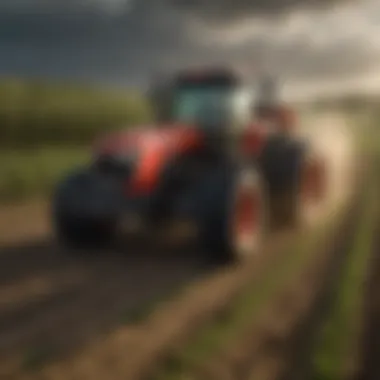Insights into Justin WK4625's Agricultural Innovations


Overview of the Topic
Agriculture is a fundamental aspect of human civilization, directly influencing food production and sustainability. In recent years, the integration of innovative practices and technologies has reshaped the agricultural landscape. This discussion focuses on Justin WK4625, an influential figure within this domain. By examining his methodologies and insights, we uncover pathways that enhance productivity and sustainability in farming.
Definition and Importance
Justin WK4625 represents a convergence of traditional agricultural practices and modern innovations. His work emphasizes the need for sustainable farming techniques that not only bolster crop yields but also protect the environment. This dual focus is crucial as global populations rise and the demand for food increases. By understanding Justin's approach, agricultural professionals can adopt strategies that lead to responsible resource management and economic viability.
Current Trends
The agricultural sector is seeing a shift toward precision farming, organic practices, and advanced technology integration. Data analytics, drones, and automated systems have become essential tools. Justin WK4625 aligns with these trends, promoting practices that optimize inputs and minimize waste. This approach is not just a trend; it is becoming necessary to ensure the longevity of agricultural systems.
Key Techniques and Practices
Understanding the techniques championed by Justin WK4625 can inspire farmers to innovate within their own operations.
Step-by-Step Guide
- Assessment of Soil Health: Regular testing should be done to understand nutrient levels and pH.
- Crop Rotation: Implement a diverse rotation schedule to enhance soil health and reduce pest populations.
- Technology Utilization: Adopt precision farming tools for data collection and analysis.
- Sustainable Water Management: Use rainwater harvesting and efficient irrigation systems.
- Integration of Livestock: Employ a system that combines crop production with livestock for nutrient cycling.
Tools and Equipment Needed
- Soil testing kits
- Crop management software like Agroop
- Drones for monitoring crop health
- Irrigation systems such as drip irrigation
- Hand tools for traditional practices
Challenges and Solutions
Despite the advancements, several challenges persist in the agricultural domain.
Common Obstacles
- Resource Availability: Limited access to technology and funds for small farmers.
- Climate Change: Changing weather patterns affect crop cycles and yields.
- Market Fluctuations: Price volatility can undermine financial stability for farmers.
Innovative Solutions
- Community Support Programs: Establishing cooperative purchasing agreements to reduce costs.
- Educational Workshops: Providing training on sustainable practices and new technologies.
- Climate-Resilient Crops: Investing in research and development for crops that can withstand higher temperatures and drought.
"Sustainable farming is not just an option; it is a necessity for the future."
By exploring the work and methodologies of Justin WK4625, agricultural professionals can glean significant insights that help navigate these challenges and embrace opportunities. Embracing these innovations serves not only to enhance productivity but also to ensure a sustainable future in agriculture.
Foreword to Justin WK4625
The significance of Justin WK4625 in the agricultural sector cannot be overstated. His methods, insights, and developments in farming practices have resonated widely among professionals and enthusiasts alike. This section provides a thorough introduction to the man behind the innovations, covering his early influences and how they shaped his career.
His work offers a fresh perspective on modern agricultural practices, prompting deeper examination of sustainability and efficiency. Understanding his background and career trajectory helps illuminate the motivations behind his methodologies and contributions. This foundational context sets the stage for discussions on innovative farming techniques and their implications for agricultural productivity.
Background and Early Life
Justin WK4625 grew up in a rural landscape, where agriculture was an integral part of community life. From a young age, he was immersed in agricultural practices, observing the seasonal rhythms of planting and harvesting. His family's farm offered hands-on experiences that led to a deep appreciation for both traditional and modern farming techniques. These formative years provided him with critical insights into the challenges farmers face daily.
Education played a significant role in shaping his views on agriculture. He pursued studies in agronomy, where he learned both the science and art of crop management. It was during this time that he began to explore innovative methodologies that would later inform his professional practices. His academic background, combined with real-world experiences, paved the way for his future endeavors in agriculture.
Career Trajectory in Agriculture
Justin's career in agriculture began shortly after completing his education. He initially worked as an agronomist, where he became attuned to the technical aspects of crop management. It was during this phase that he recognized the need for integrating technology into farming practices. His early projects involved experimenting with various crop management strategies that prioritized both yield and sustainability.
As he progressed in his career, Justin started to gain recognition for his unique approaches. His work focused on data-driven practices that enhanced efficiency without compromising the environment. Over time, he transitioned from individual projects to broader initiatives aimed at transforming agricultural practices on a larger scale.


His leadership positions in various agricultural organizations further solidified his reputation as a thought leader. Collaborating with other professionals, he contributed to significant advancements, particularly in areas like precision agriculture and sustainable practices. Justin WK4625's evolution from a curious young farmer to an influential figure in agriculture illustrates a commitment to continuous learning and innovation that remains at the core of his work.
Innovative Farming Techniques
Innovative farming techniques are crucial to shaping the present and future landscape of agriculture. These methods offer farmers new ways to improve efficiency, enhance productivity, and ensure sustainable practices. Understanding these innovations helps professionals make informed decisions that impact both their operations and the environment.
Foreword to New Methodologies
The term ‘new methodologies’ refers to the evolving practices adopted by farmers to achieve better results. These can include techniques like vertical farming, hydroponics, and aquaponics. They are reshaping how food is produced while minimizing land and water use. With urbanization, innovative methods allow agriculture to occur in city environments, closer to consumers.
Moreover, new methodologies emphasize a shift towards resource efficiency. For example, using drones for monitoring crops helps in identifying issues more quickly than ever. This timely response can lead to higher yields and reduced waste. Additionally, embracing practices like organic farming aligns with consumer demand for healthier food options and can also lead to premium prices in the market.
Precision Agriculture Strategies
Precision agriculture represents a significant advancement in farming methodologies. It involves using data-driven approaches to ensure that every plant receives optimal care. The key components of precision agriculture include soil testing, crop scouting, and variable-rate technology.
- Soil Testing: Regular soil analysis allows farmers to understand nutrient levels and pH balance. This knowledge aids in applying fertilizers and amendments more accurately, thus reducing costs and environmental impact.
- Crop Scouting: Utilizing technology to monitor crop health can identify stress signs early. This proactive method often involves using sensors or aerial imagery to gain insights about the field's condition.
- Variable-Rate Technology: This strategy enables farmers to apply inputs like seeds, fertilizers, and pesticides in varying amounts across a field. By tailoring applications to specific areas, farmers can significantly improve input efficiency while lowering costs and minimizing negative effects on the ecosystem.
"Precision agriculture is about making the right decisions based on accurate data, leading to better results and environmental stewardship."
These strategies illustrate the growing interdependence between technology and agriculture. As farmers integrate smart farming tools, they can enhance operational efficiencies while promoting sustainable practices. In the long run, these methodologies will support better crop management, thus aligning agricultural objectives with global sustainability goals.
Impact on Crop Management
Understanding the impact on crop management is critical in the contemporary agricultural landscape. Justin WK4625's methodologies have reshaped the way farmers approach the intricate task of managing crops effectively. The benefits of effective crop management go beyond mere yield improvements. This section provides insight into how WK4625 techniques can enhance productivity, efficiency, and sustainability.
Enhancing Crop Yields
The enhancement of crop yields remains a primary focus in agricultural practices. Justin WK4625 advocates for a multifaceted approach that incorporates both traditional practices and innovative techniques. Implementing crop rotation, for example, not only boosts soil health but also leads to increased yields through improved plant diversity.
Another significant aspect is the selection of high-yield crop varieties. Justin emphasizes choosing the right seeds suited to the local environment, including resilience to pests and climate variability. Farmers employing these strategies can witness a substantial increase in their output.
Additionally, nutrient management plays a vital role. By analyzing soil health and applying necessary fertilizers at the right time, crop yields can greatly increase. Efficient irriagation systems, tailored to meet the specific needs of different crops, also contribute to maximizing production potential.
Integrating Technology in Crop Monitoring
Integrating technology into crop monitoring is a game-changing aspect of modern agriculture. Justin WK4625 illustrates how digital tools, such as satellite imaging and IoT devices, can provide real-time data on crop health, soil moisture, and pest activity. These technologies help farmers make informed decisions based on precise information, guiding them toward effective interventions.
For instance, drone technology allows for the monitoring of large areas of farmland quickly and efficiently. Using visuals taken from drones, farmers can identify distressed areas that may require immediate attention. This level of detailed monitoring not only facilitates timely responses but also reduces unnecessary inputs, promoting sustainability.
Incorporating farm management software can also streamline operations further. With tools such as crop planning modules and financial management systems, farmers can analyze their inputs and outputs, ensuring they maximize profitability.
By adopting these technological improvements, farmers can significantly enhance their crop management capabilities. This integration is not only about keeping up with trends but is essential for maintaining competitiveness in an increasingly challenging agricultural environment.
Sustainability Initiatives
Sustainability initiatives have become a cornerstone of modern agricultural practices. Understanding their significance is crucial for farmers, agronomists, and industry stakeholders. In this article, we will dive into specific elements that define sustainable practices, the benefits they confer, and the considerations necessary to implement them successfully. The work of Justin WK4625 highlights the need for these initiatives as agriculture faces growing scrutiny regarding its impact on environmental sustainability.
Sustainable agriculture aims to produce food while minimizing adverse effects on the environment and ensuring economic viability. The integration of sustainability initiatives fosters a balance between agriculture and nature. This, in turn, offers multiple benefits:
- Resource Conservation: Waste reduction and efficient use of water and soil preserve vital natural resources.
- Biodiversity Enhancement: Promoting diverse farming systems ensures resilience against pests and diseases.
- Climate Change Mitigation: Reducing emissions through efficient practices helps combat global warming.
Implementing sustainability initiatives requires thoughtful planning and comprehensive approaches. Farmers must consider local environmental conditions, market demands, and available technologies.
Sustainable Farming Practices
Sustainable farming practices encompass various strategies aimed at promoting environmental health and economic resilience. One prominent aspect is the adoption of crop rotation, which helps maintain soil fertility and reduce pests naturally. Utilizing cover crops is another effective method; they protect the soil from erosion and improve organic matter.


Another important method is the reduction of chemical inputs. Utilizing integrated pest management (IPM) can effectively control pest populations while lowering reliance on synthetic pesticides. Farmers can achieve a more sustainable farming approach through these practices, improving overall farm appearances and benefits like increased profitability.
In addition, community-supported agriculture (CSA) has gained recognition as a viable model. Through direct partnerships, farmers secure an early investment, thus minimizing market risks and promoting sustainable practices.
Agroecological Approaches
Agroecological approaches focus on applying ecological principles to farming. They emphasize local resources and traditional knowledge, leading to more resilient agricultural systems. The core idea is to create synergies between farming and ecology, enhancing productivity sustainably.
Three key principles guide agroecological approaches:
- Diversity: Encouraging a variety of crops and animals creates a balanced ecosystem, reducing reliance on external inputs.
- Integration: Combining crops and livestock allows for the recycling of nutrients, promoting a closed-loop system that benefits all components.
- Knowledge Sharing: Farmers learn from one another, fostering innovation grounded in local conditions and experiences.
Adopting agroecological practices also promotes community resilience. Engaging local communities in food production strengthens food security, while empowering individuals to reclaim food sovereignty. Farmers who incorporate agroecology into their operations contribute to sustainable food systems that prioritize both ecological health and social equity.
"Sustainable initiatives are not just a trend. They are a necessary evolution for agriculture to thrive in a changing world."
In the evolving landscape of agriculture, sustainability initiatives are not simply an enhancement but rather a fundamental shift towards responsible farming. The implementation of sustainable farming practices and agroecological approaches holds immense potential for shaping a more equitable and environmentally sound agricultural future.
Integration of Technology in Agriculture
The integration of technology in agriculture is a defining factor for future farming practices. Acknowledging this shift is key for anyone involved in agriculture, from farmers to investors. Technology serves to enhance efficiency, improve crop management, and make farming more sustainable. Understanding how to harness these advances is beneficial not only for productivity but also for long-term viability in the changing landscape of agricultural industry.
One of the most significant aspects of this integration is how it enables farmers to optimize their resources. By employing advanced tools and methods, agricultural professionals can monitor soil health, track weather patterns, and manage crop planning effectively. In this way, resources such as water and fertilizers can be used more intelligently, thereby minimizing waste.
Additionally, technology provides a means for real-time data collection. Farmers can evaluate their operations instantly. This data-driven approach allows for precise adjustments in farming practices. The benefits are manifold, as there is a notable increase in crop yields and a reduction in costs associated with inefficiencies.
"Technological advancements have transformed agriculture, allowing for more informed and timely decision-making."
Adopting Smart Farming Tools
Adopting smart farming tools is essential in today’s agriculture. These tools consist of various technologies that deliver critical data and insights directly to the farmer. Examples include drones, IoT devices, and automated machinery. Each of these tools contributes to heightened productivity and enhanced environmental stewardship.
Drones, for instance, are widely used for crop surveillance. They provide aerial views of fields, allowing farmers to identify areas requiring attention. This capability helps in implementing focused interventions instead of blanket applications of water or pesticides, promoting resource conservation.
Moreover, Internet of Things devices offer valuable information regarding field conditions. Sensors can detect moisture levels, nutrient concentrations, and other vital parameters. This real-time feedback means that farmers can respond promptly, which can significantly impact crop growth and yield.
Data-Driven Decision-Making
Data-driven decision-making is redefining what it means to farm effectively. It is no longer sufficient to rely on historical data alone. Current technological tools allow for the assimilation of vast amounts of real-time data. This data can be analyzed to derive insights that directly inform farming practices.
Making decisions based on accurate, updated information enhances the efficacy of inputs. Whether it’s determining the best times to plant crops or managing irrigation systems, data-driven choices lead to improved outcomes. For instance, predictive analytics can forecast pest infestations, enabling pre-emptive actions, thus safeguarding yields.
Case Studies of Success
The importance of case studies in agriculture cannot be overstated. They provide real-world examples of how innovations and methodologies can lead to tangible benefits. In the context of Justin WK4625, these case studies illustrate the practical application of his techniques and showcase their effectiveness in various farming environments. They serve as valuable references for agricultural professionals seeking to improve their practices. By examining these successful farms, we gain insights into the challenges and triumphs encountered during implementation.
Exemplary Farms Utilizing WK4625 Methods
Several farms have adopted the methods pioneered by Justin WK4625. These farms have reported improvements in both yield and sustainability. For instance, a farm in California has utilized WK4625's precision agriculture strategies to optimize resource usage. This approach has led to a 30% increase in crop yield and a significant reduction in water consumption. The integration of sensors and data analysis allowed the farmers to make informed decisions about irrigation and fertilization.
Another farm in Iowa has embraced WK4625’s agroecological approaches. By implementing diverse crop rotations and enhancing soil health, they have created a resilient farming system. The farm experienced improved nutrient cycling and increased biodiversity, which in turn boosted resilience against pests and diseases. This exemplifies how adopting WK4625 methods can lead to long-term sustainability in farming.
Long-Term Impact Assessment
Evaluating the long-term impacts of adopting WK4625’s methodologies reveals crucial insights for the agricultural community. Assessments often highlight the economic benefits derived from improved yields and reduced inputs. Over a five-year period, farms utilizing these methods have shown remarkable financial returns.
Moreover, environmental assessments indicate that these practices contribute positively to soil health and biodiversity. By reducing chemical dependencies, farms enhance their ecosystem services, which can lead to higher resilience against climate variability. These long-term studies play a critical role in convincing skeptics of the efficacy of innovative agricultural practices. They underscore the potential for sustainable farming approaches to provide both economic and environmental benefits.


"In agriculture, success is measured in both quantity and quality. The long-term impacts of adopting new methods determine not only the profitability but also the ecological footprint of farming practices."
In summary, the case studies of farms that have implemented WK4625 methods provide a strong foundation for understanding the potential transformations in modern agricultural practices. They highlight remarkable success in both yield enhancement and sustainable practices.
Challenges in Modern Agriculture
The agricultural sector faces numerous challenges that are increasingly becoming more complex due to a variety of factors. Understanding these challenges is crucial for farmers, policymakers, and other stakeholders in order to develop effective strategies. This section outlines two significant aspects of these challenges: Environmental Factors and Economic Considerations. Both elements impact the viability and sustainability of farming practices today.
Environmental Factors
Environmental factors play a critical role in shaping agricultural practices. Climate change, soil degradation, and water scarcity are some pressing issues that farmers must address. The variability in weather patterns can significantly affect crop yields, often leading to harvest failures. For example, prolonged drought conditions limit water availability, negatively impacting irrigation systems and crop growth.
Furthermore, soil health is becoming a focal point due to its direct influence on agricultural productivity. Farmers who neglect soil management may face decreased fertility, reducing the land’s potential to produce viable crops. The use of chemicals and fertilizers often leads to soil contamination, which can result in long-term ecological damage.
To navigate these challenges, farmers must adopt better management practices. Implementing conservation techniques like cover cropping or reduced tillage can help maintain soil integrity and reduce erosion. Additionally, exploring alternative sources of irrigation, such as rainwater harvesting, can alleviate stress on existing water resources.
Investing in sustainable practices not only improves crop resilience but also secures environmental health for future generations.
Economic Considerations
Economically, farmers are grappling with fluctuating market prices, rising input costs, and access to finance. Market volatility can create uncertainty, making it difficult for farmers to plan effectively for their production cycles. For instance, the prices of key crops can drop sharply, leaving farmers with substantial losses if they were unable to predict market trends.
Moreover, the cost of inputs, including seeds, fertilizers, and equipment, continues to rise. Smallholder farmers often find it particularly challenging to absorb these increased expenses. Access to credit and financial support can be limited, stifling their ability to invest in essential technologies or practices that could enhance productivity.
To address economic challenges, diversifying crops may provide farmers with a way to stabilize income. Exploring value-added products, such as organic produce or processed foods, can open new market opportunities. Additionally, building cooperatives to share resources and knowledge can empower farmers economically and collectively.
Future Trends in Agricultural Practices
Understanding future trends in agricultural practices is crucial in today's fast-evolving landscape. With ongoing environmental challenges and technological advancements, the agriculture sector must adapt to ensure food security, sustainability, and economic viability. Farmers and industry professionals are increasingly recognizing the importance of embracing new methodologies and innovative technologies. These trends not only focus on boosting productivity but also consider the long-term impacts on ecosystems and communities.
Emerging Technologies
The introduction of emerging technologies in agriculture marks a significant shift in how farming is conducted. Technologies such as artificial intelligence, blockchain, and drone technology are at the forefront of this transformation. These tools help farmers monitor crops, analyze data, and make informed decisions. For instance:
- Precision Agriculture: The use of sensors and GPS technology allows for precise data collection on soil conditions, moisture levels, and crop health. These insights enable targeted interventions, reducing waste and improving yields.
- Blockchain Technology: This technology enhances transparency in supply chains. It allows consumers to trace the origins of their food, ensuring quality and safety.
- Drones and Imaging Technology: They are increasingly used to survey fields, providing real-time information on crop health and enabling timely action to mitigate issues.
The application of these technologies leads to greater efficiency. As farmers adopt these tools, they can reduce operational costs and improve their competitive edge in the market. Moreover, these innovations open doors to new business models and opportunities.
Global Agricultural Policies
Global agricultural policies play a pivotal role in shaping the future of farming practices. Policies impact everything from trade regulations to sustainability initiatives. As the agricultural community becomes more interconnected, understanding the implications of these policies is essential. Key areas of concern include:
- Sustainability Goals: Many countries are setting ambitious sustainability targets. Policies focused on reducing emissions and promoting eco-friendly farming techniques have been developed to mitigate the environmental impact of agriculture.
- Trade Agreements: Trade policies influence food security and farmer viability worldwide. Fair trade agreements can enhance access to markets, benefiting producers, especially in developing nations.
- Research and Development Funding: Governments often fund research in agricultural technologies. This funding supports innovation and encourages collaboration between academic institutions and the agricultural sector.
Adapting to these policies requires agility among agricultural stakeholders. A thorough understanding of forthcoming regulations and standards can significantly impact farm operations, investment strategies, and overall market presence.
The future of agriculture hinges on the successful integration of technology and policy to navigate the complex challenges ahead.
The End
In this article, we explored the significant contributions of Justin WK4625 to modern agricultural practices. The discussion highlighted how WK4625 exemplifies a paradigm shift in the way agriculture operates today. It is essential to recognize that Justin's innovative methodologies and emphasis on sustainability are not just trends; they represent critical responses to challenges the industry faces.
Summary of Key Insights
The insights gleaned from analyzing WK4625's work detail several pertinent aspects of agriculture:
- Innovative Farming Techniques: Justin WK4625 champions precision agriculture, introducing technologies that enable more efficient resource use.
- Sustainability Initiatives: Emphasis on sustainable practices helps mitigate negative environmental impacts while promoting long-term viability in farming.
- Technology Integration: The incorporation of data-driven decision-making supports farmers in maximizing yields and minimizing waste.
- Challenges and Future Directions: Understanding the hurdles in agriculture, including economic and environmental factors, is crucial for developing effective strategies going forward.
"The future of agriculture lies in innovation and sustainability. By integrating modern methods, we can achieve improved outcomes for both farmers and the environment."
The Path Forward for Agriculture
Looking ahead, the prospects for agriculture appear promising, provided that the lessons learned from Justin WK4625 are taken seriously. Prospective strategies could include:
- Investment in Emerging Technologies: Encouraging the adoption of technologies such as AI and IoT can enhance farming practices significantly.
- Collaboration Across Sectors: Bridging gaps between farmers, technology experts, and policymakers can lead to innovative solutions tailored to current challenges.
- Educational Programs: Providing farmers with access to resources and training on new techniques ensures they stay updated with evolving trends.
- Support Sustainable Practices: Fostering a culture of sustainability within the agricultural sector will be paramount to addressing climate change issues and food security.



